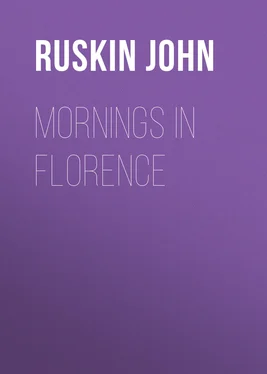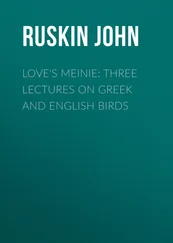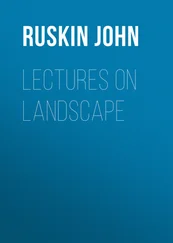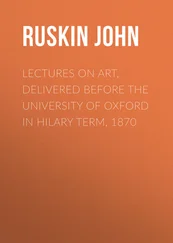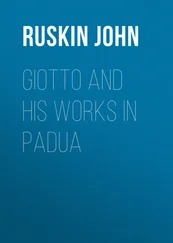John Ruskin - Mornings in Florence
Здесь есть возможность читать онлайн «John Ruskin - Mornings in Florence» — ознакомительный отрывок электронной книги совершенно бесплатно, а после прочтения отрывка купить полную версию. В некоторых случаях можно слушать аудио, скачать через торрент в формате fb2 и присутствует краткое содержание. Жанр: foreign_antique, foreign_home, literature_19, visual_arts, на английском языке. Описание произведения, (предисловие) а так же отзывы посетителей доступны на портале библиотеки ЛибКат.
- Название:Mornings in Florence
- Автор:
- Жанр:
- Год:неизвестен
- ISBN:нет данных
- Рейтинг книги:4 / 5. Голосов: 1
-
Избранное:Добавить в избранное
- Отзывы:
-
Ваша оценка:
- 80
- 1
- 2
- 3
- 4
- 5
Mornings in Florence: краткое содержание, описание и аннотация
Предлагаем к чтению аннотацию, описание, краткое содержание или предисловие (зависит от того, что написал сам автор книги «Mornings in Florence»). Если вы не нашли необходимую информацию о книге — напишите в комментариях, мы постараемся отыскать её.
Mornings in Florence — читать онлайн ознакомительный отрывок
Ниже представлен текст книги, разбитый по страницам. Система сохранения места последней прочитанной страницы, позволяет с удобством читать онлайн бесплатно книгу «Mornings in Florence», без необходимости каждый раз заново искать на чём Вы остановились. Поставьте закладку, и сможете в любой момент перейти на страницу, на которой закончили чтение.
Интервал:
Закладка:
"The cup which my Father hath given me, shall I not drink it?" In what was its bitterness?—thought the boy. "Crucifixion?—Well, it hurts, doubtless; but the thieves had to bear it too, and many poor human wretches have to bear worse on our battlefields. But"—and he thinks, and thinks, and then he paints his two little pictures for the predella.
They represent, of course, the sequence of the time in Gethsemane; but see what choice the youth made of his moments, having two panels to fill. Plenty of choice for him—in pain. The Flagellation—the Mocking—the Bearing of the Cross;—all habitually given by the Margheritones, and their school, as extremes of pain.
"No," thinks Giotto. "There was worse than all that. Many a good man has been mocked, spitefully entreated, spitted on, slain. But who was ever so betrayed? Who ever saw such a sword thrust in his mother's heart?"
He paints, first, the laying hands on Him in the garden, but with only two principal figures,—Judas and Peter, of course; Judas and Peter were always principal in the old Byzantine composition,—Judas giving the kiss—Peter cutting off the servant's ear. But the two are here, not merely principal, but almost alone in sight, all the other figures thrown back; and Peter is not at all concerned about the servant, or his struggle with him. He has got him down,—but looks back suddenly at Judas giving the kiss. What!— you are the traitor, then—you!
"Yes," says Giotto; "and you, also, in an hour more."
The other picture is more deeply felt, still. It is of Christ brought to the foot of the cross. There is no wringing of hands or lamenting crowd—no haggard signs of fainting or pain in His body. Scourging or fainting, feeble knee and torn wound,—he thinks scorn of all that, this shepherd-boy. One executioner is hammering the wedges of the cross harder down. The other—not ungently—is taking Christ's red robe off His shoulders. And St. John, a few yards off, is keeping his mother from coming nearer. She looks down , not at Christ; but tries to come.
And now you may go on for your day's seeings through the rest of the gallery, if you will—Fornarina, and the wonderful cobbler, and all the rest of it. I don't want you any more till to-morrow morning.
But if, meantime, you will sit down,—say, before Sandro Botticelli's "Fortitude," which I shall want you to look at, one of these days; (No. 1299, innermost room from the Tribune,) and there read this following piece of one of my Oxford lectures on the relation of Cimabue to Giotto, you will be better prepared for our work to-morrow morning in Santa Croce; and may find something to consider of, in the room you are in. Where, by the way, observe that No. 1288 is a most true early Lionardo, of extreme interest: and the savants who doubt it are—never mind what; but sit down at present at the feet of Fortitude, and read.
Those of my readers who have been unfortunate enough to interest themselves in that most profitless of studies—the philosophy of art—have been at various times teased or amused by disputes respecting the relative dignity of the contemplative and dramatic schools.
Contemplative, of course, being the term attached to the system of painting things only for the sake of their own niceness—a lady because she is pretty, or a lion because he is strong: and the dramatic school being that which cannot be satisfied unless it sees something going on: which can't paint a pretty lady unless she is being made love to, or being murdered; and can't paint a stag or a lion unless they are being hunted, or shot, or the one eating the other.
You have always heard me—or, if not, will expect by the very tone of this sentence to hear me, now, on the whole recommend you to prefer the Contemplative school. But the comparison is always an imperfect and unjust one, unless quite other terms are introduced.
The real greatness or smallness of schools is not in their preference of inactivity to action, nor of action to inactivity. It is in their preference of worthy things to unworthy, in rest; and of kind action to unkind, in business.
A Dutchman can be just as solemnly and entirely contemplative of a lemon pip and a cheese paring, as an Italian of the Virgin in Glory. An English squire has pictures, purely contemplative, of his favorite horse—and a Parisian lady, pictures, purely contemplative, of the back and front of the last dress proposed to her in La Mode Artistique. All these works belong to the same school of silent admiration;—the vital question concerning them is, "What do you admire?"
Now therefore, when you hear me so often saying that the Northern races—Norman and Lombard,—are active, or dramatic, in their art; and that the Southern races—Greek and Arabian,—are contemplative, you ought instantly to ask farther, Active in what? Contemplative of what? And the answer is, The active art—Lombardic,—rejoices in hunting and fighting; the contemplative art—Byzantine,—contemplates the mysteries of the Christian faith.
And at first, on such answer, one would be apt at once to conclude—All grossness must be in the Lombard; all good in the Byzantine. But again we should be wrong,—and extremely wrong. For the hunting and fighting did practically produce strong, and often virtuous, men; while the perpetual and inactive contemplation of what it was impossible to understand, did not on the whole render the contemplative persons, stronger, wiser, or even more amiable. So that, in the twelfth century, while the Northern art was only in need of direction, the Southern was in need of life. The North was indeed spending its valour and virtue on ignoble objects; but the South disgracing the noblest objects by its want of valour and virtue.
Central stood Etruscan Florence—her root in the earth, bound with iron and brass—wet with the dew of heaven. Agriculture in occupation, religious in thought, she accepted, like good ground, the good; refused, like the Rock of Fesole, the evil; directed the industry of the Northman into the arts of peace; kindled the dreams of the Byzantine with the fire of charity. Child of her peace, and exponent of her passion, her Cimabue became the interpreter to mankind of the meaning of the Birth of Christ.
We hear constantly, and think naturally, of him as of a man whose peculiar genius in painting suddenly reformed its principles; who suddenly painted, out of his own gifted imagination, beautiful instead of rude pictures; and taught his scholar Giotto to carry on the impulse; which we suppose thenceforward to have enlarged the resources and bettered the achievements of painting continually, up to our own time,—when the triumphs of art having been completed, and its uses ended, something higher is offered to the ambition of mankind; and Watt and Faraday initiate the Age of Manufacture and Science, as Cimabue and Giotto instituted that of Art and Imagination.
In this conception of the History of Mental and Physical culture, we much overrate the influence, though we cannot overrate the power, of the men by whom the change seems to have been effected. We cannot overrate their power,—for the greatest men of any age, those who become its leaders when there is a great march to be begun, are indeed separated from the average intellects of their day by a distance which is immeasurable in any ordinary terms of wonder.
But we far overrate their influence; because the apparently sudden result of their labour or invention is only the manifested fruit of the toil and thought of many who preceded them, and of whose names we have never heard. The skill of Cimabue cannot be extolled too highly; but no Madonna by his hand could ever have rejoiced the soul of Italy, unless for a thousand years before, many a nameless Greek and nameless Goth had adorned the traditions, and lived in the love, of the Virgin.
Читать дальшеИнтервал:
Закладка:
Похожие книги на «Mornings in Florence»
Представляем Вашему вниманию похожие книги на «Mornings in Florence» списком для выбора. Мы отобрали схожую по названию и смыслу литературу в надежде предоставить читателям больше вариантов отыскать новые, интересные, ещё непрочитанные произведения.
Обсуждение, отзывы о книге «Mornings in Florence» и просто собственные мнения читателей. Оставьте ваши комментарии, напишите, что Вы думаете о произведении, его смысле или главных героях. Укажите что конкретно понравилось, а что нет, и почему Вы так считаете.
